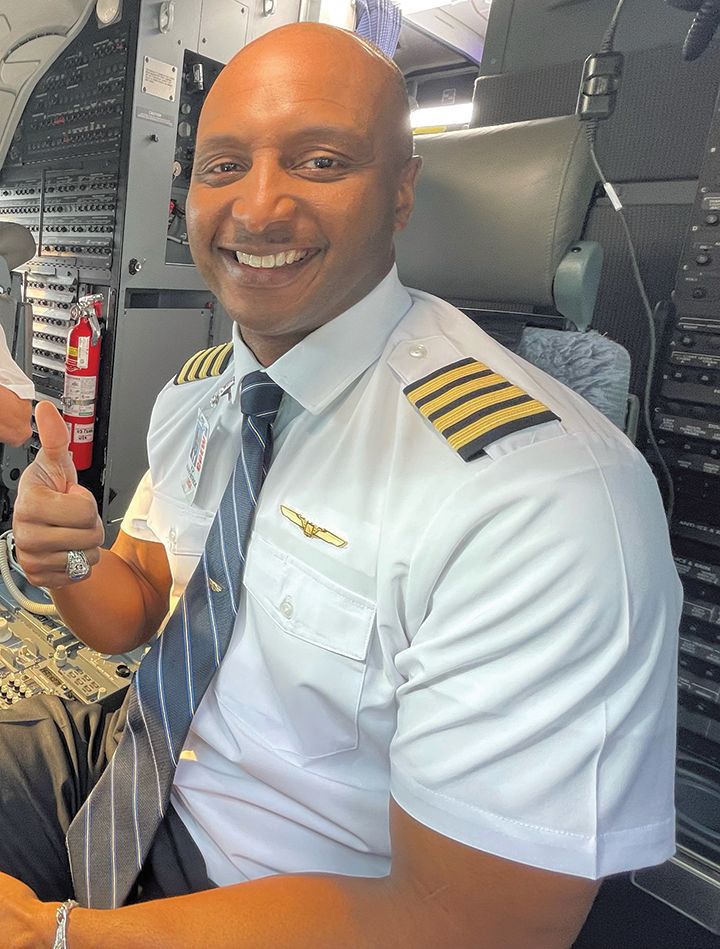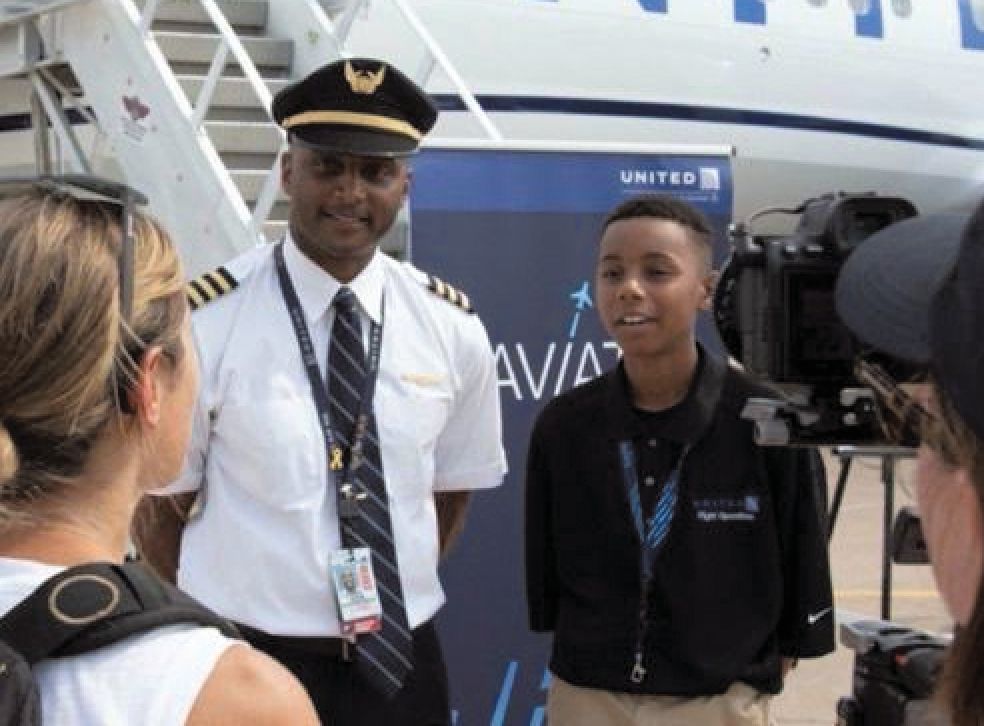The face of change

The United States boasts a large and diverse job market which includes everybody regardless of skill, color, or ethnicity. But it wasn’t always like this. Black Americans were at one point limited to the type of jobs they were able to have. Over time and with perseverance, many were able to break through the mold and change the perception of Black people in the workforce.
One person who was and still is aiding the concept of making room for Black people in career fields that lack a melanin touch, is Captain Kenneth “KP” Kirkpatrick, a United Airlines Captain and Lt. Col in the United States Air Force Reserves.
Kirkpatrick is a Compton native but became a basketball star at Arlington High School in Riverside. His life took a turn once he made it to college.
The adjustment
“The interesting part of me going to the Air Force Academy was to play basketball. I didn’t even know flying was a possibility until I got there,” Kirkpatrick said. “I only went there because I was offered a full ride, my people back at home had no college funds for me, so I took the offer without hesitation.”
Kirkpatrick was excited about the opportunity to play basketball, as that was his dream until he realized his on-the-court success wouldn’t transfer to off-the-court success.
“When I got there, it was a rude awakening because I never did ROTC, and the only knowledge of the military I had was from my dad because he enlisted when I was young,” Kirkpatrick said as he detailed some of the hard times he had adjusting to college life in the academy. “It was a crash course in military lifestyle while playing division one basketball, I eventually fell behind on my studies.”
While Kirkpatrick detailed his shortcomings when initially enrolling at the academy, he also thanked them because they made him develop and improve upon his time management skills, discipline, and his integrity as a man. As time went on, he started training and gained experience about what it meant to be in the military and, soon enough, what it meant to be in the Air Force.
Kirkpatrick knew from a young age he didn’t want a corporate job or to sit behind a desk all day, but he didn’t know that he was going to trade his basketball for wings.
“I kind of fell into the whole pilot thing during the summer going into my sophomore year. It was the first time I piloted a glider in our soaring program, and that’s when I knew I wanted to be a pilot,” Kirkpatrick said as he described the moment he fell in love with flying. Getting on the gliders was his second time ever being on an airplane. His first time was when he left California to go to the academy.

The court or the sky
Kirkpatrick states that flying gives him a feeling of freedom that he hadn’t felt before, even basketball didn’t give him the same feeling.
“Immediately once you take flight you feel that freedom, you control the aircraft and knowing what I do has a direct impact on the outcome of the situation I am in,” he said. “ It’s never a bad day once you get above the clouds, everything is clear, and the sun is always shining.”
Ironically, Kirkpatrick previously had a fear of heights, but he said that while he was scared of looking down from tall buildings, it is different than being a plane’s captain, because he is the one in control.
Once Kirkpatrick dedicated himself to his newfound dream, he was ready to compete with his classmates to earn his wings at graduation.
One has to compete academically in air force training to earn a pilot slot, as there are very few slots to go around.
“You have to compete every day until graduation to get your wings,” Kirkpatrick said. “I went through the basic and hardest way, by going through the soars program, doing good in that, then entering the pilot training program where you still have to compete to get a pilot slot at graduation.”
‘Marking my name is history’
While finishing both programs and on the road to graduation, Kirkpatrick noticed the lack of Black peers around him and realized that what he was about to accomplish, few have.
“When I looked around, there weren’t many people that looked like me. There were multiple moments during the academy when I was the only Black person in my class.” he said as he described the racial disparity in the academy and military. “Even when assigned to my first squadron, I was the only Black person there. It weighed heavy on my mind because I’ve been in the army for 20 years, and we are still behind when it comes to numbers.”
Kirkpatrick noted that while Black faces were far and few, the ones that were present banded together to create a Black student union called The Way of Life committee, where Black students were able to connect and support one another on their journey in the academy and further.
The pilot also credits learning about the Tuskegee Airmen during his time at the academy for why his vision and purpose changed from personal to generational. His goal changed to help the generations after him.
Upon completion of pilot training, Kirkpatrick earned the C-17 Globemaster III as his major design series aircraft. Over the 12 years of his active-duty career, he went on to earn a Master’s Degree in Aeronautical Science from Embry-Riddle Aeronautical University; became an evaluator; a demonstration pilot; command missions worldwide, including a humanitarian mission for Hurricane Katrina; and fight the global war on terrorism in Iraq and Afghanistan.
Paying it forward
After retiring from active duty, Kirkpatrick returned to his hometown of Riverside and began working for United Airlines as a pilot of the Boeing 757 Aircraft.
“I liked living bi-coastal as I was flying out of Newark Airport at first, but with my experience from the Air Force, I was able to transition into other programs that kept me closer to home,” he said as he talked about his life at United Airlines.
“I became a flight qualifying manager at LAX; I was in charge of hiring all the new pilots at LAX while still flying as a newly appointed captain,” he said.
Kirkpatrick is grateful for the position he is in now because it allows him to fulfill his purpose of pushing and supporting the next generation of Black pilots to greater heights and changing the stigma of the lack of Black pilots. He also thanks United Airlines for their effort in supporting him and his goal.
“I know the numbers in Black pilots will change because United Airlines is dedicated to hiring minorities, people of color, and women as our CEO Scott Kirby has supported this notion fully,” Kirkpatrick said as he talked about United’s new programs, created to help minority pilots.
United has launched the Calibrate program, an in-house apprenticeship program that will help grow and diversify its pipeline of Aircraft Maintenance Technicians. In the 36-month program, participants “earn and learn” getting paid while completing the full-time certification and training process. Since participants get paid while they train, they forgo the expense of a technical school which can cost up to $50,000.
“Calibrate is a great opportunity for people who are interested in pursuing a rewarding career as an aircraft technician but don’t have the resources or support they need to attend traditional technical schools or colleges,” said Rodney Luetzen, United’s vice president of line maintenance. “This program will provide life-changing opportunities, help to diversify our workforce, and give us access to an even bigger pool of talented, qualified, motivated people.”
United also has its flight school, United Aviate Academy, which is celebrating its first inaugural graduation of 51 pilots this year.
“United is leading the industry in the training, recruitment, and hiring of the next generation of talented commercial pilots, and the progress we’ve made at United Aviate Academy after just one year is another example of an airline where good leads the way,” said Kirby. “I’m so proud of this first class of graduates. They’ve taken an important first step in their career, and they reflect our commitment to hiring people who exceed the highest professional and safety standards. I look forward to welcoming them to our United team, and I can’t wait to see them flying our new United Next planes in the years to come.”





